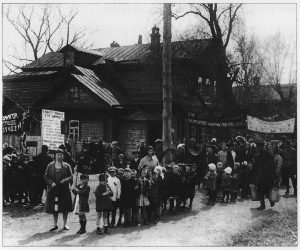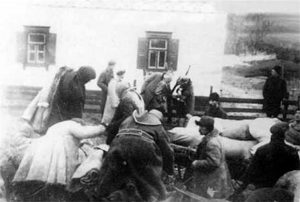The resolution formally enshrined Stalin’s directives, voiced by the Soviet leader on January 21, 1930 in his appeal ‘On the policy of liquidation of the kulaks as a class’.
“In order to eliminate the kulaks as a class, it is necessary to openly break their spirit and resistance, and deprive them of the sources for further existence and development. The party’s current policy in the towns and villages marks a new procedure for eliminating the kulaks as a class,” said Joseph Stalin, secretary general of the Central Committee of the Communist Party of the USSR.
Stalin’s first objective was to rid society of the peasantry, which concealed ‘capitalist elements (kulaks)’, and was thus irrevocably hostile to the regime. Dekulakization consisted in expropriation, eviction of entire families, deportation of millions of farmers, and, in the event of resistance, physical annihilation.
This Resolution defined dekulakization quotas, i.e. first and second categories for each region or republic of the Soviet Union. The first category kulaks, defined as ‘activists, engaged in counter-revolutionary activities’, were to be arrested and sent to labour camps after a brief appearance before the so-called judicial ‘troika’. The most ‘dangerous’ activists were to be sentenced to death while second-category kulaks, defined as ‘exploiters’, but less actively engaged in counter-revolutionary activities’, were to be deported to distant Siberian regions. Dispossessed, deprived of their civic rights, deported, exiled to remote areas of the USSR, these kulak families were assigned to ‘special villages’ run by the OGPU (NKVD as of 1934).
In January 2020 (90th commemoration of the total extermination of private property in the USSR), Radio Liberty and the National Museum of the Holodomor Genocide launched a special project – ‘Dekulakization: how the Stalinist regime destroyed Ukraine’s free peasant class’. Hundreds of testimonies about dispossessed and persecuted families have been sent to Radio Liberty’s editorial office and been reprinted online.
Here are some examples of letters received by Radio Liberty.

From: Oleksandr Kostiuchenko
[boxright][/boxright]Dekulakization. How Stalin liquidated the Ukrainian peasant class (Part 1)
Village of Strumok (formerly Rudnia Moshenska or Rudnia Moshna), Korostensky Raion, Zhytomyr Oblast. Most old maps do not show this village, but a hamlet where my family lived since the early 19th century.
My grandfather’s grandfather had a small workshop, or rather a smithy, where he produced iron elements. Our family name is mentioned in the old church books dating back to 1851.
My grandmother Nina Kazymyrivna Korotun (maiden name Yesypovych) was born into a family of seven children in 1912. They had land and cattle. Everyone partook of meals at the same table, including the hired field workers.
Our family home was a large spacious building, surrounded by many outbuildings. My grandmother was the eldest daughter. The Bolsheviks arrived in the hamlet when she was 15 years old. They confiscated the house and took over all the buildings. The entire family was turned out into the street. All material possessions were taken away.
For some time, the family stayed in a tiny dugout; then the parents were arrested and sent to Kazakhstan. Locals took the children into their homes so that they wouldn’t die of starvation.
My grandmother was married off very early and this saved her from deportation. She never saw her parents again. She lived in fear that the Bolsheviks would come for her. She changed her date of birth and patronymic – from ‘Kazymyrivna’ to ‘Karlivna’. She lived with her family in a nearby town, where she worked in a military canteen.
It was only recently that she revealed these tragic events to her family… she was constantly afraid.
I have one vivid memory from my childhood. There were nine of us. If ever a piece of bread fell from the table, my mother (Valentyna, born in 1937) would pick it up, kiss it, and whisper something. I was five years old and of course, I copied my mother’s behaviour. Only later did I understand why my mother acted this way and the significance of her behaviour.
The town of Korosten still has a square called Komsomolska and there is a monument with two figures in large overcoats and budionivkas (distinctive type of hat, part of the Communist military uniforms of the Russian Civil Wara (1917-1922-Ed). The komsomolka holds a Mauser, but someone covered it… and wrote ‘the youth of Korosten region in the 1920s’.
From: Oleksandr Revenko
My great-grandfather, Yevdokym Revenko, village of Balandyne, Kamiansky Raion, Cherkasy Oblast disappeared suddenly. The entire family was dispossessed and evicted.
Great-grandfather Tereshko Hudzenko also disappeared.
From: Milava Antonyk
My maternal grandfather – Serhiy Orystarkhovych Ovcharenko, born in 1910, from the village of Buhayivka, Luhansk Oblast; the eleventh child in the family.
He told us that the family had only one cow, which was taken away during dekulakization.
From: Liubov Bilous
My great-grandmother – Yaryna Demyanivna (or Domiantivna) Sarnavska, maiden name Yanovych, was a widow; her husband died before collectivization; she lived with her six children in a hamlet in the woods near the village of Liakhova (now Osychky) Radomyshlsky Raion, Kyiv Governate (now Zhytomyr Oblast).
Her property was confiscated: land, cattle, equipment, wood supplies. Yaryna and her children were transported to the neighbouring village of Hriada (Pribudok).
All the locals were executed or deported to Siberia. The village was erased from all archives and maps; only a few handmade granite tombstones with some surnames – Kulakivsky, Vyshnevsky, Tychyna – remained.
Such crimes and many more were committed by the communist government… There’s still so much to learn, but no one to ask.
My grandmother Antonina Sarnavska, born in 1911; she died a long time ago.
My paternal grandfather Stepan (Stefan) Ivanovich Repetsky was also persecuted, but he survived Stalin’s concentration camps, served in the war, and was discharged due to war injuries. All his brothers and close relatives were also persecuted and interned in soviet camps and prisons … No one lived long enough to be rehabilitated!
In the archives, I can’t find exact information about my other grandmother Halyna Stanislavivna Zborovska. She was Polish. It is supposed that she was born in Dermanka, Malyn Raion, Zhytomyr Oblast.
From: Valentyna Bilyk
My grandmother Vira’s family lived in Chudniv Raion, Zhytomyr Oblast.
There were many children in the family. They were quite prosperous. They had land, equipment, furniture, a pair of oxen and horses. Grandma told us that they kept a lot of pigs. In autumn, the family members gathered to prepare cured meats and barrels of lard for the winter.
They worked alone; there were no employees. Everyone worked hard, both adults and children. My grandmother told us how at the age of five she and her brothers went out into the fields to graze their horses all through the night.
There were no hired workers, so the family was not deported to Siberia. However, during this period, everything was taken from them – even food from the oven and beans set aside for planting.
Half of the children and the father died of starvation, the mother and the other children barely survived. My grandmother was saved by the fact that she was already sixteen years old at that time, so she was sent to work in Khmelnytsky Oblast, where she met and married my grandfather.

Free access to the archives and this project have helped many Ukrainian families and individuals to find distant or close family members and re-open long forgotten or lost family histories.
From: Fedir Indutnyi
On behalf of our family, I would like to thank Radio Liberty for the dekulakization project. Some time ago, a distant relative contacted us. She had read your article about my great-grandfather Fyodor Pakholchak, as recounted by my mother, and seen the fragment of our family tree.
After reading the article, she realized that our great-grandparents were close relatives. She wrote to me and it was an incredible shock for all of us. It’s just amazing! Thank you!
From: Mykola Fishchuk
Many thanks for this special project – ‘Dekulakization: how the Stalinist regime destroyed Ukraine’s free peasant class’. On June 28, 2020, you published a story about the destruction of my family from Zhytomyr: the Morozov, Kravchyk, Hordiychuk, Eismontov, Poliansky, and Marchevsky families.
We knew very little about these events, as the Stalinist regime stifled the truth and persecuted anyone who disseminated such news. This project helps us – the descendants of these kulak families – to remember the horror and suffering that our ancestors experienced. This must be studied and revealed publicly so that it never happens again.
Thanks to your publication, I found information about my grandmother’s brother – Andriy Ivanovich Marchevsky, whose fate was totally unknown.
According to case No.422 (14083 П) “Marchevsky and his family, including his wife and five underage children should be sent to the White Sea Canal”. However, he and his family were deported to the mining village of Maryivka, Pavlohrad Raion, Dnipropetrovsk Oblast, where Andriy and his son Stanislav died in 1939.
His other two sons, Franz and Mykola, were still children when they were mobilized in the Soviet Army. They miraculously survived the battle of Kharkiv in May 1942, returned home to Maryivka, and in September 1942 were forcibly deported to work in Germany. All trace was lost at that point. Today, Andriy Ivanovych Marchevsky’s great-grandchildren live in Maryivka and take care of the ancestral graves. They have finally learned the truth about their family and about the terrible times their ancestors lived through. We often talk over the phone. Our family has grown.
Thank you for your work!
From: Ihor Sanin
I shared my impressions of the dekulakization project with my friend Oleksiy Rak from Ladyzhyn, Vinnytsia Oblast.
We’re both in our seventies, and we often discuss the tragic events that that befell our parents.
Oleksiy told me that more than ten years ago, when his mother was still alive, he shot a 1.5-hour amateur video of his mother recounting the dekulakization and famine periods that she lived through in the neighbouring village of Chetvertynivka.
It’s just awful, I have no words… It’s so difficult to listen to this woman’s story – what she saw and experienced – without shedding some tears.

Researchers and historians affirm that after the declassification of the archives of the Ministry of Internal Affairs it became possible to investigate tens of thousands of dekulakization cases. Descendants of dispossessed families can submit inquiries to the local branch archives of the Ministry of Internal Affairs and gain access to documents.
Please write to: [email protected]
TO BE CONTINUED…




